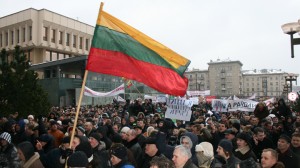VILNIUS — Nearly two decades on, Lithuanians are losing faith in the the Singing Revolution in light of the economic crisis and political scandals.
A Pew Research Center poll released Monday shows that since 1991 support for the change from the authoritarian communist regime of the U.S.S.R. to democracy and capitalism in Lithuania has declined by 20 percent and 26 percent, respectively. The country declared independence from the Soviet Union in 1990 and became the democratic Republic of Lithuania with a free-market economy.
The poll was conducted in several Eastern European countries, and Lithuania’s was one of the largest declines in both measures. Among those older than 65, Lithuanian support for the change to capitalism is 41 percent and multi-party democracy is 43 percent. Meanwhile for other age groups the number is barely over 50 percent. In 1991 over 70 percent supported the switch to democracy and capitalism.
Exactly what is causing the drop in support is up for debate. Some argue the poll results do not represent wholehearted antipathy toward the capitalist system and democratic government, but rather disillusionment with the numerous scandals that have embroiled Lithuanian politicians.
“They see certain flaws in the democratic process, but there is a a fine line between dissatisfaction with democracy and wanting to change from capitalism and democracy,” Žilvinas Šilėnas, a senior policy analyst at the Lithuanian Free Market Institute, told Baltic Reports. “People tend to take things for granted, they tend to forget how bad things were under communism.”
Šilėnas asserts that if the Lithuanian government would do things like reducing parliamentary members’ expense accounts would improve the numbers of people who approve the change to democracy. The proposal, put forward by the new Speaker of the Seimas Irena Degutienė, has met resistance in the Seimas despite public outrage at instances of personal spending while painful austerity measures are being implemented to avoid a large budget deficit.
The poll shows that 78 percent of Lithuanians consider government corruption to be the country’s top problem.

Despite the Pew poll numbers and the economic crisis the Jan. 16 Seimas riot, the largest protest in Lithuania so far this year, was not anti-capitalist but instead protesting higher taxes and public employee wage cuts. Photo by Nathan Greenhalgh.
The switch from communism to capitalism exacerbated social inequality throughout Eastern Europe, as some income levels skyrocketed while others plummeted. Especially affected have been pensioners, whose malcontent is reflected in the poll numbers.
Leonidis Donskis, the Lithuanian political activist and political science professor turned European Parliament member, points to the lack of social welfare benefits that other countries in the Baltic region such as Sweden enjoy.
“It is not a disappointment in the free market as such,” Donskis told Baltic Reports. “It is a disenchantment in the Baltic variety of capitalism, which is not reconciled to welfare state approach.”
Lithuania’s use of the flat income tax instead of progressive income taxation stands in stark contrast to its Scandinavian neighbors across the Baltic Sea.
However, Šilėnas points out that many of the protests against the Lithuanian government’s anti-crisis plan, including the January Seimas riot, have centered on increased taxes instead of calling for the wealthiest to pay a greater share of their income.
“In the beginning of the year, there was a protest but it was about higher taxes,” Šilėnas said. “Do Lithuanians want to go back to communism? I say no.”













Eastern Europe does not have the same capitalism as Western Europe, what they have is something entirely different!
Lithuanians still havent experienced what is it capitalism and democracy as whats there now definitely is not it. Its some form of post communism mixed with corruption. What would you expect if the same communist politicians are still in government ?